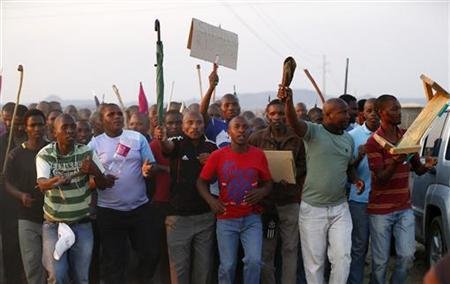
Gold Fields said most miners returned to work at its strike-hit South African operations on Thursday but a new walkout at Lonmin's Marikana platinum mine dampened hopes of an end to the worst labour unrest since apartheid.
More than 80,000 miners have downed tools since August in often violent strikes that are hitting growth and investor confidence in Africa's biggest economy and raising questions about President Jacob Zuma's leadership.
In a surprise move, 4,000 workers at Lonmin's Marikana mine stayed away from work on Thursday, disrupting operations once again at a plant where police killed 34 striking miners in August.
"There have been disruptions at various shafts since yesterday," Lonmin spokeswoman Sue Vey said. The company later said it believed the workers were protesting against the arrest of three miners as part of a police investigation.
Only a month ago the Marikana strikers returned to work after being granted pay increases of up to 22 percent following a six-week strike.
Kumba Iron Ore is expected to resume operations at its giant Sishen mine soon after clearing away strikers who had been occupying the pit for nearly two weeks, but other companies have reported fresh incidents.
Petra Diamonds said production at its Cullinan mine had been hit after a fifth of workers went on strike. Forbes and Manhattan Coal also reported disruptions at two of its mines.
Gold Fields, the world's fourth-largest bullion producer, said all of the 9,000 workers at its Beatrix mine and 90 percent of the 14,300 workforce its KDC West shafts had clocked in, suggesting most of the 12,500 wildcat KDC West strikers had heeded an ultimatum to turn up or face the sack.
"Approximately 1,500 employees who did not report for work before the deadline are deemed dismissed," the company said in a statement, adding the fired workers had 24 hours to appeal.
Gold Fields has said it may issue a similar ultimatum to 8,500 strikers at KDC East.
Dismissal threats
More and more mining companies in South Africa have resorted to threats of mass dismissals to tackle the strikes gripping the sector.
Around 15,000 workers have been sacked in the last two weeks, although experts say it is more a hardball negotiating tactic than outright dismissal.
"It's largely a tactical move," said a labour lawyer, who asked not to be named as he is involved in talks to resolve the strikes. "They don't expect to be able to run a mine with a completely new labour force."
While most of the workers will be rehired when the protests end, weeks of strikes have pushed some already struggling shafts into the red, meaning some jobs will be lost.
Anglo American Platinum (Amplats) said it would not fire any wildcat strikers at its relatively profitable Union and Amandelbult mines for now, as it seeks to engage unions to resolve the disputes.
The world's No. 1 platinum producer also said it was open to discussing the fate of the 12,000 miners already dismissed at its Rustenburg operations, which are known to be struggling.
"While it remains our stated position that we will not reinstate the 12,000 dismissed Rustenburg employees, we have agreed with our recognised unions that we are willing to discuss their status as part of this engagement," it said, without elaborating. Attendance at those mines remains below 20 percent.
AngloGold Ashanti, the world's third-largest gold producer, said it would make a decision next week on whether to issue an ultimatum to workers.
Two months of unrest, in which more than 50 people have been killed, are taking its toll on South Africa's reputation.
Standard & Poor's and Moody's have both lowered South Africa's credit rating, citing a lack of political leadership and rising pressure on the government to throw money at the social problems underscored in the mines.




